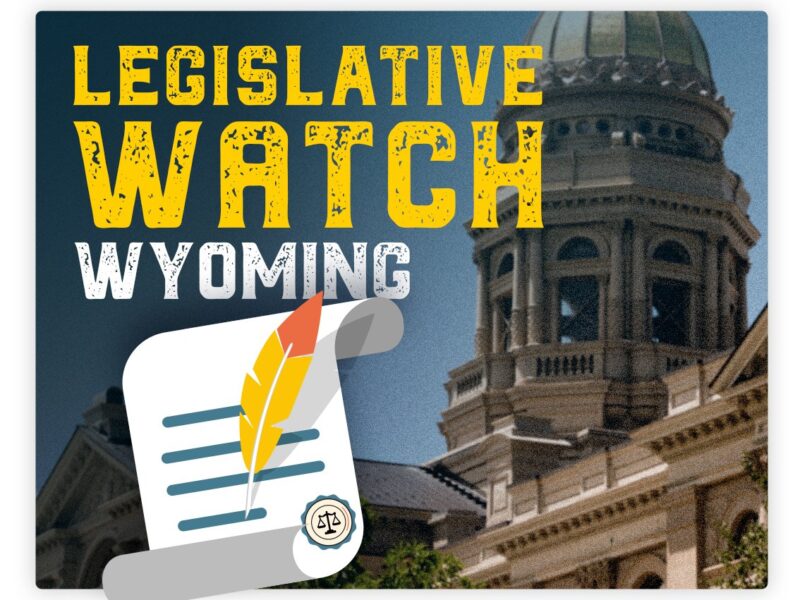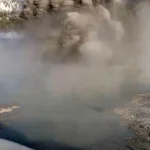LEGISLATIVE WATCH WYOMING: Lawmakers to Tackle Property Tax Relief, I-80 Maintenance, ESG in Interim (Part 1)
Legislative leaders express concern about committees considering too many topics
- Published In: Politics
- Last Updated: Mar 25, 2023

By C.J. Baker
Special to the Wyoming Truth
This story has been updated as of 12 p.m. MT on March 25.
Wyoming lawmakers are already gearing up for their next session and planning to dive into topics ranging from property tax reform to school choice to new regulations for commercial fishing guides.

The Legislature’s Management Council spent Thursday sorting out the scores of issues that the body’s 19 committees will study between now and the 2024 Budget Session. Part of the council’s aim was to focus the Legislature’s efforts.
Last year, committees drafted 209 different pieces of legislation — the second-most on record — and ultimately sponsored 135 bills. About 61% made it into law, below the typical 70-75% success rate, according to data from the Legislative Service Office.
Speaker of the House Rep. Albert Sommers (R-Pinedale) said committees have been taking on too many topics, noting their workloads in the interim have been “ever-increasing.”
“That’s not a bad thing, because we get more issues all the time, but frankly we just can’t handle it,” Sommers said. “We just don’t get good products.”
Taxing issues
As one example of the council’s topic trimming, the legislative leaders significantly narrowed the Joint Revenue Committee’s list. The panel wanted to tackle issues related to property taxes, severance taxes and sales taxes; explore new ways to fund K-12 education; derive more revenue from state land parcels; and implement a tax on electrical production. However, the council cut the severance tax and education topics and gave the state lands issue to another panel.
Property taxes remain the Revenue Committee’s top priority and co-chair Sen. Bo Biteman (R-Ranchester) said the goal is “to take a look at a more broad [approach to] property tax relief.”

Additionally, Biteman said they’ll consider ending taxes on personal property — such as business equipment — and potentially e recapture that lost revenue by making more services and items subject to sales taxes.
“In order to get major property tax relief that’s pretty expensive, you’re going to have to figure out a way to pay for it,” he explained. “Broadening the sales tax base would definitely help.”
While there was a winnowing process, the council also dumped some topics on the chairmen’s laps.
The I-80 question
Sommers and Senate President Ogden Driskill (R-Devils Tower) informed the Transportation, Highway and Military Affairs Committee that their top priority would be studying ways to fund the ongoing maintenance of I-80. Driskill said it’s critical to find options for a highway that carries valuable interstate commerce but eats up roughly half of the state’s road budget, constantly closes because of poor weather and crashes and is in deteriorating condition.
The committee’s leaders were not enthused. Noting there has been years of conversation about I-80 with little progress, co-chair Rep. Landon Brown (R-Cheyenne) suggested that, “we’re probably not going to have much more of a solution coming forward other than, ‘Let’s put some more money towards it.’”
Added co-chair Sen. Brian Boner (R-Douglas): “If there’s any specific direction as to what’s going to be different this time, I think it’d be helpful.”
Council members offered various ideas. Sen. Larry Hicks (R-Baggs) suggested the state could institute a differential fuel tax, where gas is significantly more expensive at the stations right along the interstate. He also suggested the state should crack down on semi-truck drivers who ignore signs and blow over in high winds, calling it “absolutely ridiculous” that wind-toppled trucks shut down the highway “over and over and over.”
Driskill, meanwhile, brought up the oft-studied idea of charging a toll. He suggested some public education on the subject — framing it as a user fee — could boost support.
While sympathetic to the frustration of having to revisit the I-80 issue, “eventually we have to solve it,” said Sommers. “It means we have to keep bringing it up.”

Net metering
Corporations, Elections and Political Subdivisions Committee co-chair Sen. Cale Case (R-Lander) made a similar argument in proposing his committee study electric utilities and the hot topic of net metering. Utilities are currently required to purchase power that their customers produce at retail prices — most notably from solar panels — but critics say that results in those customers failing to pay their fair share of maintaining the electric grid.
Case and others have repeatedly tried to reduce the payments, but his latest attempt failed in February. Senate File 92 drew substantial public testimony, generally from the relatively small group of Wyoming residents who own solar panels and support the status quo.
“If we don’t address net metering, and the implication, we’ll just have a larger constituency of people enjoying the subsidies, and it will get harder and harder and harder,” Case said Thursday.
In one of the few public comments of the day, Dick Merklin of the Cheyenne-based Wyoming Solar Coalition criticized lawmakers for revisiting the topic.
“It ain’t broke, it don’t need fixed,” Merklin said.
But Sen. Tara Nethercott (R-Cheyenne) said it needs to be addressed and “continuing to just try to resist any effort is just not going to be successful.”
State investments
Another topic to draw pushback was a proposal from the Joint Appropriations Committee to conduct a review of the State Treasurer’s Office.
Co-chair Rep. Bob Nicholas (R-Cheyenne) noted the office has grown significantly, as it brought its investment management in-house. He said the committee wants to see how that’s working and “whether or not their middle office and back office are performing up to speed.” The request suggested the committee might hire an independent auditor for its review.
However, Treasurer Curt Meier argued the study was not needed, noting the office is already audited and performing at a high level.

“We’re doing our job,” Meier told the council. “We want to continue to do our job and do it more effectively, and when you take staff time and my time and our investment staff’s time and our accounting staff’s time and we go to meeting after meeting and study after study, that takes it away from, basically, our ability to do the best that we can for the state of Wyoming.”
Nicholas praised the treasurer’s improvements and results, clarifying that, “it’s not that they’re doing anything wrong, it’s just that we need to understand it better ourselves.”
The council left the review as a topic, but eliminated the reference to an audit.
Combatting ESG
While it wasn’t as openly contentious, the appropriation committee appeared to ruffle some feathers by taking over the hot topic of environmental, social and governance (ESG) policies. Multiple large investment firms have begun considering ESG factors in their financial decisions, which can lead them to avoid businesses in the fossil fuels, firearms and timber industries or that aren’t seen as having progressive policies.
Legislation proposed during the recent session would have barred the state from contracting with companies that engage in ESG-related boycotts or “discrimination” and would have barred the state’s investment advisers from considering ESG factors.
Senate files 159 and 172 failed to pass after the House Appropriations Committee rewrote them and gave a “do not pass” recommendation, drawing frustration from Biteman, their sponsor. But the Management Council returned the ESG topic to appropriations instead of the Minerals, Business and Economic Development Committee. Nicholas said appropriations could probably tackle the topic “in an hour,” but Biteman reportedly disagreed with the assignment.
Meanwhile, Treasurer Meier said his office found a way to bar ESG from the state’s investment decisions, crafting a policy that will soon be considered by the State Loan and Investment Board.
The closest vote came on a proposal to create a Mental Health and Vulnerable Adult Task Force. Some members felt it duplicated other efforts, but it passed on a 5-3 vote. Another new task force aimed at reducing government regulations and making Wyoming more business friendly passed more easily.
The topics were among dozens that will be taken up in the coming months.
Check back for part two, coming to you soon.













